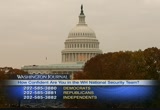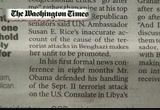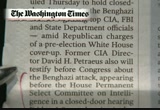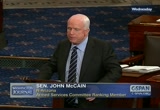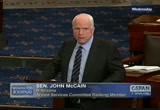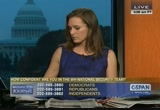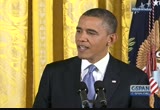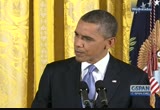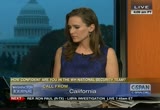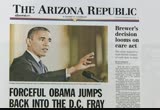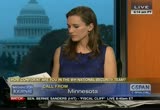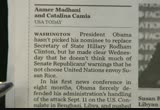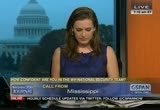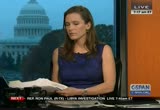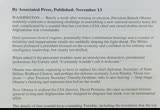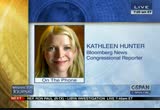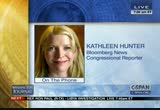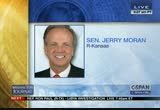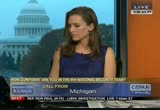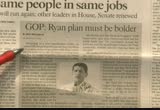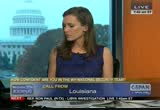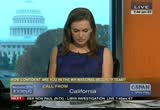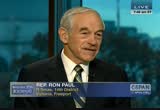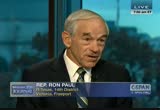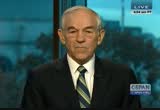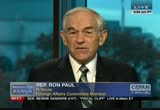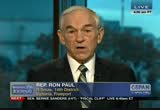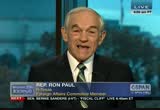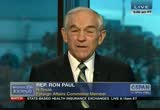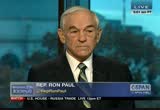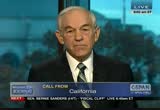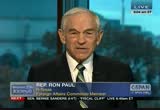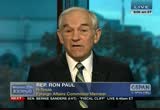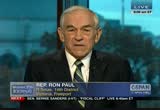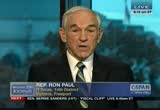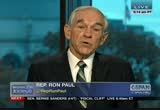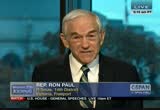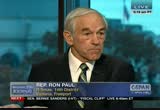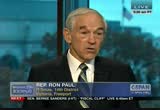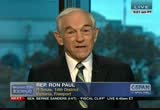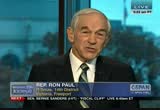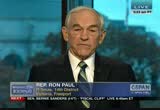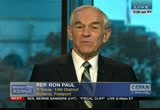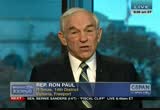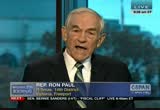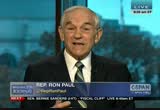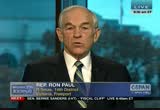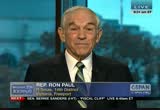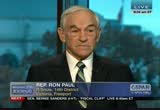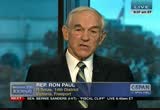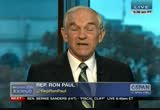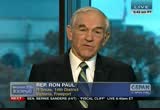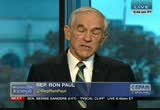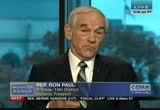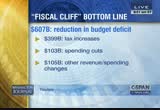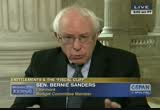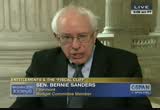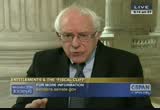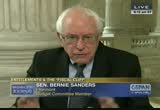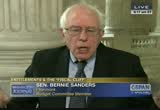tv Washington Journal CSPAN November 15, 2012 7:00am-10:00am EST
7:00 am
look at friday's deadline for states to establish health insurance exchanges under the affordable care act. "washington journal" is next. ♪ host: good morning. welcome to "washington journal." testimony today on a terrorist attack in benghazi. the national security team will testify behind closed doors. general petraeus is scheduled to testify tomorrow. we would like to hear from you this morning. how confident are you in the white house national security team?
7:01 am
7:02 am
7:03 am
how confident are you in the white house team? president obama defended yesterday amid criticism he received for poor performance given the issue. let's take a listen to some of the criticism that has been employed. this is on the senate floor yesterday. john mccain called for the select committee to investigate the attacks. [video clip] >> why is it that anybody including our ambassadors to the united nations would believe spontaneous demonstrations are composed of people with
7:04 am
mortars, rocket-propelled grenades, and heavy weapons? nobody believes that. why did president obama insists that he labeled the defense an act of terrorism on september 12 when we know now -- i repeat, we know now in an interview on the same day he refused to characterize the attacks in this way and spent two weeks putting the emphasis on a spontaneous protest to a hateful video including in his address to the united nations on september 25? we need a select committee. americans deserve to know. the families of those slain americans need to know. why in the world the administration or our friends and the other side of the aisle or anybody would test -- resist
7:05 am
the appointment of a select committee. host: we will hear president obama's response to criticism. our question first is, how confident are you in a white house national security team? our first caller is from the democrats' line. caller: thank you for taking my call. i appreciate all the things c- span does. there are not enough people bringing issues like this to light. i am the father of two young the marines. things like this really get my attention. it seems like as the information comes out about this more and more each day, it is more and more questions. people have to stop and look at this for the good of the nation. there are way too many things that do not meet the eye. i think yesterday the president got a free ride on questioning
7:06 am
this in front of the american people. today this will go behind closed doors. it will classify everything as top secret. we will never know the truth. host: what would answer your questions? caller: i do not know if it is possible to do that because of the media. there is not enough real reporting going on. i do not mean to be negative about this. if you turn on the mainstream media, it is all about brittany spears underwear and what happened last week. even this thing going on with the general, it is about the sex, not how it affected the military and the decisions made. they're saying general petraeus went to libya on a fact-finding mission himself one week before he resigned. it is all strange. there is one other thing i would like to say. here in new york stake, we have
7:07 am
time warner cable. forever it seems like -- we could always get c-span without having to have a cable box. they have taken that option away. if we do not pay extra and have the cable box, we cannot get c- span. i thought you would like to know that. host: here is the "baltimore sun." here is what president obama had to say. [video clip] >> let me say specifically about
7:08 am
susan cries, she has done an exemplary work. she has represented our interests in the united nations with skill, professionalism, toughness, and a grace period as i have said before, she made an appearance at the request of the white house and which she gave her best understanding of the intelligence that had been provided to her. if senator mccain and senator gramm and others want to go after somebody, they should go after me. i am happy to have a discussion with them. for them to go after the u.n. ambassador who had nothing to do with benghazi and was simply making a presentation based on intelligence she had received
7:09 am
and to besmirch her reputation is outrageous. host: president obama at a press conference today. the ambassador he was talking about is susan rice. here is an image of her in "the washington times." our question for you this morning is about the white house national security team. here is what steve tweets -- morris in san diego and joins us now, a republican color. caller: i have no confidence whatsoever in this national security team. i have less confidence a denture
7:10 am
the president. i think this whole thing leads right to the white house. write to the oval office. president obama has made some statements already there are so contradictory there is no way he can explain the contradiction of his comments. you talk about a transparent administration -- yes, there are transparent. you can see right through them. there are as corrupt as any i have seen. i think this will lead to impeachment. i think he will be convicted of it as well. host: here is what bill says on twitter. charlie on the independent line. caller: i am not happy with senator mccain. he lost the election. he is still trying to get even for their loss of the election. he is a great supporter of our
7:11 am
country attacking iran. how many soldiers and how many people will get killed because of the disaster that would be if we got involved in iran. he should be one of the people doing the news on fox because that is all the talk about all the time. they are constantly attacking the president. he was reelected and he is the president. he did not attack anybody in benghazi. every day if you turn on fox news, i am tired of it. but the president get on with what he is supposed to do. host: "usa today" has this headline. here is the front page of "the arizona republic."
7:12 am
patrick on the democrats' line. caller: good morning. what i have to say is projecting the weakness and disorganization as a whole to the public will not help this country. people need to basically try to fix the country. if something like been gauzy happened, we should be able to find out what happened and take steps to make sure it does not happen again. that is all i have to say. host:gial joins us on the republican line. caller: how are you this morning. host: where are you calling us from? caller: i am right outside of the milwaukee area. i do not have any confidence in the security team. the reason i do not is because
7:13 am
if you are going to go out of in public and be a puppet and say everything you are told to say -- not to speak the truth to the people like this administration -- how can you have confidence in people that are going to repeat lies to you? i cannot wait to hear the general speak on friday. i think it is behind closed doors. i think he will be a key to the whole thing. the country needs better than what we have. host: it's like it will be behind closed doors. the initial meetings so far. do you want to hear what he has to say? caller: for sure, because he will be the one with answers. i hope he speaks to the truth and stays alive long enough to do so. host: the soil not sure what you mean by the last part. caller: people have a way of disappearing in this country.
7:14 am
i guess i have been around too long. people who seem to have the trees do not have a chance to speak it. he is way up there on top, i am afraid for his life, actually. host: minn., an independent scholar. caller:-- caller. caller: host: i am 63 years old. i was a military man myself. i spent a lot of time doing some spying when i was in the navy. there has not been anybody since eisenhower that has done a good job of trying to protect this country. the progressives have taken over all over this country.
7:15 am
republican, democrat, it does not matter. what they have done is they have made this country the laughing stock of the world. we tried to project power. our actual strength has been diminished so much now that we are never going to get it back. i think the safest thing would be to protect our own borders and shores and leave the other countries around the world alone. host: here is a tweet from jan. "usa today" --
7:16 am
7:17 am
excellent. you have to really watch what mccain and lindsey -- even though mccain was a world war veteran, i feel sad because he was an all out military guy but he really joins the other guys who act like they hate the president. what they're saying about the ambassador is ridiculous. they hate him. i did not care what anybody else says, they hate him because of his skin color. they paid the same thing about the ambassador. they do not want her to represent america. we already voted for the president. host: 1. to clarify -- senator mccain serve vietnam. do you think since he won reelection he has a mandate to make some decisions?
7:18 am
can he be forceful right now? caller: yes, we already said what we wanted. he is the president. more than half of the people already voted for him to run the country. he should not go overboard, but he has a mandate to get things done. people want jobs. i have been to 15 or 20 countries and all of them are like, oh, in america. things have improved the way we do business. i think he is the best thing to ever happen to america. --eally think caller: caller host: we lost our caller. secretary of state hillary clinton will be leaving the
7:19 am
state department although congressional inquiries have put a crimp in any plans to exit immediately. with leon panetta refusing to indicate whether he will leave or stay put, the president will have to fill the pentagon pose a top civilian job. we are looking at the future of the obama cabinet as well as other positions like the director of the cia. david joins us from wisconsin. we are talking about the national security team. caller: i am a veteran, 67 years old. i do not see a national security team. president obama is commander in chief. he sat there and watched four guys get killed on tv and not
7:20 am
even an effort was made to rescue them. that is pretty disgusting. there was no national security. that is basically my opinion. host: what do you want to see happen now? caller: they should have an investigation and get to the bottom of it. why all the lies. host: is that congress's role? should they have an outside body? caller: it is congress's role as long as they have a bipartisan committee. it is interesting that a lot of the politicians are retiring and leaving. i think congress should set up a committee to check it out. host: from the associated press --
7:22 am
n. we have them pulling a lot of -- the only thing i know that comes out of beirut is hezbollah. the susan rice and secretary of state, they rubbed shoulders with some strange people. the muslim brotherhood -- we can have them and our state department. it scares me to death. i do not want any people like that running our country. host: taking a look at another story on the news. we get a better picture of what the house and senate and the upcoming 113 congress. here to talk with us more about that is kathleen from bloomberg
7:23 am
news. caller: good morning. host: one of the big stories yesterday is nancy pelosi, the top democrat in the house plans to stick around in her job as minority leader. how surprising was that news yesterday? caller: the sense upon reporters is that was what we expected. i think there was some questions both in 2010 when democrats lost control of the house. then again this year when democrats fell short of their initial goal of regaining control of the house whether leader nancy pelosi would stick around. i think she was signaling quietly by not letting people know she was staying.
7:24 am
i think it was clear she wanted to first talk about and give the news to democrats behind closed doors. host: what does it indicate in terms of the direction of congressional democrats? what can we read from this move? caller: that the pelosi doctrine or the leadership she has had over 10 years, she was very instrumental in a lot of passing the legislation that the obama administration passed during its first term. health care, dodd-frank, a lot of these pieces of legislation. we are going to continue to see her in her role as minority leader and working to hold house
7:25 am
democrats to a position that was republican attempts to roll back -- any attempts to roll back obama initiatives. host: we see a lot of familiar faces in the leadership lineup. or has changed? caller: we are going to end up with the top three people staying in their current roles. one of the interesting outcomes is that -- the highly contested race against tom price for the conference chairmanship. kathy was the one female member of the republican leadership looking to move up into a high- ranking role. paul ryan is returning from the presidential challenge. he backed, price.
7:26 am
i think that is a significant development and something to watch and pay attention to, particularly given the fact there is a lot of discussion about -- relationship they have right now. host: is it the top of leadership with the house republicans? caller: we still have john boehner, eric cantor who will stay on with those rules that have had since 2011 when republicans took control of the house. in terms of strategy and approach, we are dealing with the same players we were dealing with before the election. host: turning toward the senate, what is the news there? caller: a lot of the same there as well. the republicans and democrats
7:27 am
met yesterday morning behind closed doors and basically reelected the same leaders should have said for some time now. harry reid on the democratic side. on the republican side of mitch mcconnell and john corn and who is coming off of two cycles on the republican campaign committee. he will be replacing john kyl who is retiring. another couple of people down the ladder were reelected. there was an opening for for the campaign committee slot.
7:28 am
thank you for talking with us. our question this morning is your level of confidence in the white house national security team. let's hear from carrie from michigan. caller: good morning. can you hear me? i think this is another cover up for the republican party. look at what condoleezza rice did. she was telling people there were weapons of mass destruction in iraq and to still became secretary of state. 250 people killed in beirut under the reagan administration. they are having all of these investigations. i would think maybe we could move on from this. they have not found one iota
7:29 am
where this administration has been involved in any cover up. this is something to hold up immigration laws, getting a job laws. they are having a hearing on the vote to -- no evidence whatsoever. this is the same thing. benghazi happened and a one answers the next day when they have all different agencies coming in with a different scenarios. they pick one and they tell the public this. these people -- this is a slowdown game. just something to slow the administration down. > host: how are you? caller: another day and a life.
7:30 am
as far as the national security team, they went with joe biden's dopey take on afghanistan and it has made things 100 times worse. it is really bad over there right now. they pretty much shut out everything that petraeus had done with the counterinsurgency. they made it is about killing as many terrorists as they possibly can. they are bombing sovereign countries and their decapitating these networks and we're finding out that just killing the terrorists, you are making more terrorists. you're not solving the problem. they had seven hours to respond. at one. they even have on the top of the cia -- you do that have --
7:31 am
you do not stop shooting unless you think there is some kind of support. there is a lot about the timeline that does not make any sense. the more i hear about it, the more i think we are totally screwed with the team that we have right now. host: let's go to the independent line. hi, susan. caller: yes, i am somewhat confident with the administration. i like hillary clinton. i really am concerned that petareus stepped down. i think his personal issues should have been between his wife and his family. i think it is more important to stay on. i have a problem with people jumping to conclusions about thinking people can give people
7:32 am
a chance. we did not jump to conclusions about 9/11 originally. there is a great comparison with condoleezza rice with faulty information given to her by organizations. i think it is a little bit of a hypocritical stance -- i respect john mccain. i think it is hypocritical he would stand there and defame and this particular woman when he supported the confirmation of condoleezza rice who had a faulty information that sent us into a war that we do not even know eight years later why we were in iraq. we need to get to the bottom of it. i do not think the administration should be let off the hook. a war that we should never have been and, i think condoleezza
7:33 am
rice has more to answer for. i think a lot of it is political. some of the stuff is just political where republicans feel like this is something to jump on just because of obama. i think a lot of democrats are going to defend it just because it is obama. we as americans should want the truth, not our own political thing and say, oh, well. we need to be more concerned about the truth for americans and not so much about our political stances. host: here is a story from "washington times."
7:35 am
arlene from north carolina, a democrat. caller: i have three things i want to briefly state. they have a new law that you can be held without council and all of the other stuff. everybody knows about it. this is a perfect example of a case where all of these guys, two and nt the women, should have been taken and. we should have seen them arrested. they probably have done something to the national security. that is terrorism. the second thing is, i really -- these guys are so high, you really cannot believe petraeus in 37 years only had one girlfriend.
7:36 am
who knows what was going on with 9/11 in new york. my neighbor lost both of his legs a few months back in the military. he knew the level of secrecy he applied to be under. as far as these people who are religious, it is god's will. that is all i can tell you. host: a story in "usa today." it looks at troops that are injured and their recovery. let's go to james in dallas, texas.
7:37 am
caller: good morning. the answer to your question. it is very difficult to have a lot of confidence in the security team regardless of what happened in benghazi. the president could have come out and given the public the truth. a lot of callers will call in and say people do not like barack obama because of his skin color. i voted for barack obama in 2000 because of his skin color. i wanted this country to get passed a landmark issue of electing a african-american for president. one of your earlier callers mentioned the daywear the target. i see no reason why this administration did not take action. if they did not take action because they did not know what
7:38 am
was happening, i think there is evidence they did know what was happening, it is unforgivable. if they did not know what was going on, that is even more inexcusable. host: manhattan, kansas. dave is an independent caller. caller: i just wanted to say the foreign policy of obama is a spitting image of bush. we have droned more pakistan as than bush under obama. it is only creating more terrorists. we see what is going on with the arab spring .
7:39 am
7:40 am
more news on the political and domestic front. president obama pressed for higher taxes but he adds caveats. is it president obama met with business leaders. the headline from "the washington journal -- the wall street journal." looking at the republican side of the fiscal house, republicans say the plan must be
7:41 am
7:42 am
former presidential candidate obama wins president a balmy to gifts. we will talk more about politics in a little bit with our guests, congressman ron paul. let's take a few more calls about your confidence with the national security team. caller: give me a moment or two, please. first of all, i am a democrat and i am for the troops. look at this. to's compare for lives lost
7:43 am
7000 lives lost over a lie. condoleezza rice supported a lie that bush had no intelligence that would not have stopped 3000 americans killed on our own american soil. he also supported a lie there were no weapons of mass destruction that cent over 4000 american military personnel to their deaths as well as tens of thousands of iraqis to their death. let's be honest about this. i do not know what senator mccain and senator lindsay are about, but they are hypocritical. they give such glowing reports of condoleezza rice. she was a credit to her race and all these things. we are talking about 7000 lives lost on a lie. this is versus four lives lost.
7:44 am
i am all for the troops, but let's tell the truth as it is. host: from our facebook page -- alex from california, a republican caller. caller: good morning. thank you for c-span. i have complete trust in the fbi, cia, at home and security. i have complete trust within the confines of their agency walls. if you look at all of the botched terrorist plots that have been occurring since 9/11, it is absolutely amazing what our agencies are doing to keep us safe. who i do not trust is the white
7:45 am
house suits who apparently put a spin on the nsa's official briefs and input on worldwide events. i believe the white house puts a political spin on everything that comes to the president, to the secretary of state. then to the american people. it was 9/11 when we had benghazi going down. that is a data i think the president would rather have nothing going down. apparently there was something going down. with petraeus, is it not ironic that he is now being the scrutinized over these extramarital affairs when he is about to testify in regards to what happened in benghazi. >>let's get a couple more
7:46 am
comments on facebook and twitter. thank you for all of your calls. coming up next, congressman ron paul, a republican of texas set to retire. he will talk about that, the fiscal cliff, and the latest from benghazi. later on, bernie sanders will talk about entitlements and the fiscal cliff. we will be right back. [captions copyright national cable satellite corp. 2012] [captioning performed by national captioning institute]
7:47 am
>> truman was a vice president for 82 days. being truman, he actually presided over the senate. nowadays, the vice-president does not bother with that unless his vote is needed. he was there every day presiding. he said, that is my job. he never learned anything from fdr or his staff. the transition was with a zero knowledge. that is that happen anymore. he got a phone call from the white house. he picked up the phone and at the other and they said, get to the white house as soon as you can. so he grabbed his hat and dashed out. they gave him a chauffeur.
7:48 am
he went to the white house and was taken upstairs to the second floor, which was the family for. -- family floor. eleanor roosevelt said, harry, the president is dead. he was in total shock. he said, what can i do for you? she said, harry, what can we do for you? you are in trouble now. >> from his early life of his presidency, aida donald looks at the life of i harry lifen "citizen soldier." >> the miami but fair -- the miami book fair international, featured authors include bill o'reilly, reyna grande, joan
7:49 am
walsh, and christopher hitchens. live coverage begins saturday at 10:00 eastern and sunday at noon on "book tv." >> "washington journal" continues. host: ron paul men from texas, welcome and thank you for being here. you are facing retirement. this is the last few weeks of your term facing the people of texas. the fiscal cliff is a big issue on the agenda in the winning weeks of congress. what do you want to see? caller: there is lots that i want to happen. i have been here for 30 years and nothing has happened. i only have two weeks left. i do not think much will happen.
7:50 am
the real solutions are not even discussed. what they do a denture january, they will get some type of an agreement that they will solve their problems later. it will appease a few people. i do not think a major calamity is going to happen in january. it will do something very temporary. it is sort of like when we hear the news about the problems and greece. how many solutions have they had. the have probably had 15 solutions. every time they come up with a solution, the markets respond favorably. the whole problem whether it is greece or the united states is we are broke. most countries in the world are not solvent except maybe in the far east. there are not facing up to the fact admitting we are broke. if you or i are broke, we have
7:51 am
to cut spending back for work harder or declare bankruptcy. but a country does not do that as long as the credit is good. because of our past performance, because there is still wealth in this country and we have a strong military, it is proceed we will work our way out of it. our credit remains good. that really discourages politicians from feeling the pressure to do something. they're not talking about any cuts. neither side wants a significant real cut of anything. it is and possible. i think we are at the point where we have passed the opportunity to actually work our way out of this. the inevitable will be delayed and it will take a while for people to realize we have to change what we are doing a denture our government. i think that is what the people have to realize. -- in our government. host: if you would like to
7:52 am
speak to congressman ron paul, here are the numbers to dial. let's take a look at one of the issues at stake, the tax increases that could happen if congress does not take action. we have a graphic on the screen to show our viewers. if you make in the 20,000 rage or lower year tax increase will be $400. if you make under $40,000 you are looking at a $1,200 increase. it goes up from there. if you make between 64,100 $8,000, you could see a boost of your taxes with $3,500. if you make even more than that, you are looking at a $15,000 tax increase. do you think congress -- do you
7:53 am
think this will happen? you just talked about what the 103rd congress may do in the coming year, but what about the short-term stuff? guest: it represents the fact they do not have a solution. they give these temporary cuts on the withholding tax. they are kidding themselves. i think they will probably change that a little bit. they still will face a major problem. this is a reason i think the markets are so weak since the election. not only are they facing this crisis, but the tax -- the taxes are going to go up. the president is pretty blunt on the spirit will only face it on the rich. the rich are the ones who sometimes start a business and other things. you point out correctly that some of the taxes will go up
7:54 am
unless they change things on the middle-class and the poor. it will be devastating to the economy. there is no easy solution because nobody wants to consider that we have to cut spending, change foreign-policy and we have to reassess the entitlement system. they are not in the new to do that. there are too many people who said, you cannot touch my program. cut somebody else's. that is the reason we are going to continue to do this and things will get worse until the crisis gets so bad we have a currency crisis, interest rates go up, we will have to revamp. that will not happen in january. host: but the to the funds and see what the viewers have to say to you. -- let's go to the telephones and see what the viewers have to say. caller: i think all of the bush tax cuts should be eliminated and those dollars be applied to
7:55 am
the deficit. for the areas under sequestering, i think they should eliminate the requirement that everything to be cut across the board and let the defense department to determine what they need and what they do not need. the same with the discretionary areas. guest: i agree with half of what you say. i think the military is a big problem. both sides really did not want to touch because they believe we should be involved with all of the countries around the world, we should be involved in all of these wars. i said, no. stop fighting these wars. our national debt through the bush and obama administrations, our debt went up over $4 trillion just because of these wars that are totally senseless.
7:56 am
the loss of life. now there are talking about, what are we going to go in -- we are so much involved with libya. look at what is happening with libya. it want to go to war against iran. i would say, that is the place to have big cuts. we all ought to agree on doing that. i want to raise -- i would not raise taxes. we need to cut spending. if you raise taxes, you're going to have a weaker economy. some of the tax cuts, even for the middle-class occurred for the bush administration. you do not want to raise taxes on the middle class. it will not be enough money. i think you have touched on something. i think we need to deal with the military. we cannot do that unless we change the foreign policy. we are not the world policeman getting involved with all of
7:57 am
these countries. i think the american people ought to agree on that issue more readily than anything else. i do not see why we should talk about cutting health care for children or for the elderly and social security -- i do not think that is where you start. you have to start by changing our foreign policy. host: as republicans come to the negotiating table, would you think it will be willing to agree on? my guess is they will agree on some tax increases and it will call it tax reform. it will probably agree to some of these so-called spending cuts. even the spending cuts with sequestration, they are not cuts. there are token little cuts on proposed increases. the automatic increases with baseline budgeting. this is what is so deceptive is that cuts are not cuts. cuts are just backing off a
7:58 am
little bit on automatic increases. so they are going to agree probably to raise the taxes and pretend they are cutting by taxing and by not increasing the spending quite as rapidly. it will not solve the problem. that is what i think will happen. host: natalie on the republican line. caller: thank you for your service. i look forward to hearing about what you do after your career. i, myself, and my husband are both serving in the military. both of us cannot be -- both of us are disturbed by what is happening with benghazi and petraeus and allen. i just wanted to ask you, i do not want to say there is a cover up happening or what not, but i cannot help but see that there is some kind of correlation between all of these high wig
7:59 am
generals or armed forces -- the fact that something is happening with them and the whole situation with benghazil. i just want to know from your standpoint, how you feel about the two? guest: there are a lot of things you have to sort out there. first, the wars that have been going on and whether the responsibility of the cia. they have the sex scandal. they have the cover up. i think the sex scandal -- the cover up is natural. they always have investigations, but that is a blend game. i think they are missing the whole thing. -- that is a blame the game. i am more interested in talking about responsibilities. we have general petraeus that are running these wars that are a total disaster and all he gets
8:00 am
is high praise. he gets put over in the cia and he does not even realize the ability to look at e-mails. he is supposed to protect us. look at the protection the cia gave people in benghazi. they turned on us. this is happening in afghanistan. after they get trained, they turn around and shoot the trainers. that policy makes no sense whatsoever. how this pans out remains to be seen. we have to deal with the policy itself. other countries realize there is a big problem in libya. we should not have been involved
8:01 am
in libya. the authority was coming from nato. the bad guys come in and turn on us. what is the reason they do this? what is the motive? and the killing that occurs -- they have to have a motive. what is going on? that is what we should be looking at. we have a real mess of a scandal. when we get involved in wars we should not be involved in, believe me, we will have chaos and it will continue. host: alex writes in on our
8:02 am
facebook page and has this question for you. >> they have a personal responsibility and they need to understand that. government reflects the people. guest: we need to restrain the government. the constitution has no restraints on the people. it is trying to get people to realize that self-reliance is better than relying on the government. they can get away with it for a while. they destroyed the currency.
8:03 am
they argue for free-market economics, property rights, money, argue the case for central banking and that self- determination is important. the smaller the units of government the better. they have to follow through wherever they are and to have a market economy. the more freedom a country has, the more prosperous it will be. that format is we should have and that will solve many of our problems. host: eric, go ahead. men, i wouldress b
8:04 am
say you're a hero. i would like your opinion about what is going on right now with israel and palestine. possible actions against iran and may be pulling us in. guest: that has been a mess for a long time and we should not take sides. it would be best for that region. i don't believe in getting involved. has been created by to many outsiders interfering. -- that doesn't make a lot of sense. what threat are the palestinians? they are living in total
8:05 am
poverty. sure, there are going to be militants. what is the reason? they have been held in bondage for decades. i think we should not be involved. eventually is real and not be able to depend on the united states -- eventually israel will not be able to depend on the united states. it makes no sense to do that. that is what they are anxious for us to do. what happens when we go broke and when it is acknowledged and we cannot afford to feed ourselves? our military is going to go home.
8:06 am
we will not be there to take care of israel. all the people we have offended around the world, they are going to gang up on us and it will not be good for israel because we will not be capable of providing protection. host: this is the front page of "the pittsburgh post-gazette." ron joins us from new hampshire. caller: good morning. i am honored to speak with you this morning. libby, you look beautiful as always. i have two comments and i'll start with benghazi. it seems the republicans are
8:07 am
looking for any reason to be smirch -- besmirch this administration. funding for the and deceased was cut. maybe our people would still be alive today. maybe they should look in the mirror if they are looking for someone to blame. as far as the fiscal cliff -- the republicans have not been working with the president, along with the corruption, political and corporate corruption almost brought our economy to its knees. they did away with insider trading for the politicians a youear ago.
8:08 am
nobody in the real world is able to get inside information about stocks. politicians have that ability. it is corruption and that needs to be cleared up. host: let's get a response. guest: i am more bipartisan than you are. democrats are exempt. i see as living with a one-party system. which candidate was the goldman sachs candidate? they both support the same foreign policy and get money from wall street. we shouldn't have supported the rebels in benghazi. we ignored all the warnings.
8:09 am
we never cut anything. we should have recognized the danger. other countries knew it was dangerous. to blame republicans or democrats, i don't think that is as accurate as saying whether it was suspending policy or the welfare system, it is bipartisan. we have had too much compromising in washington because they support the same issues. they do not support the people that passed out the money. policies never change. i think the rhetoric is difference. obama had a more sensible foreign policy approach in this
8:10 am
last election. romney wanted to increase the military budget by $2 trillion. the policies are exactly the same. i would be a bipartisan in blaming both sides for this. the fiscal cliff is the same problem. look at what the conservatives do when the republicans are in charge. the spending continues. the federal reserve keeps on bailing out the rich. republicans defended the rich. they both defend welfare for the rich. they bailout the very wealthy and the bankers in this crisis.
8:11 am
but the people lost jobs and they lost their houses. if we can blame the democrats or the republicans for the problems, we are not going to solve the major crises we are involved in. host: we have a question on twitter. guest: no, i don't. republicans and democrats are in charge. they have control of the system. we send kids to afghanistan and iraq. we do not have real freedom here. if i had not run as a republican, i would not have been in the debates. i would not have been able to get any coverage.
8:12 am
you cannot get on the ballots because of the system. it is important they do their best to express themselves and show how they come up short in how the system works. it is impossible to compete under the rules today. we can do it if you have correct ideas. the prevailing economic theory of the last 60 or 70 years and nixon made a classic statement. the democratic and republican party believe in the economics. those ideas have to infiltrate the democratic party as well as the republican party.
8:13 am
to expect the libertarian party to become a major party, the only alternative we have now is to try to change people's minds and change people's understanding is economics and try to infiltrate the system so we can influence both parties. host: john is in florida. caller: good morning, sir. if the benghazi situation was a demonstration, we saw no signs of "death to america" or "death to israel." one question about the fiscal cliff. why does no one ever say pay the
8:14 am
?ayroll tax cut t guest: those are good questions. i do not have the answers, especially in benghazi. we set ourselves up for these problems. should not be doing these things. the investigation should be looking at that. solving these problems is like raising more taxes and moving up the ladder. spending is the tax. the tax is a secondary. they have to tax us or they will borrow the money, which is a
8:15 am
tax. or you print the money and you have financial baubles and crashes. spending is the problem -- you have financial baubles and and crashes. any safety net for the rich and if you believe you can police the world, none of these problems can be solved. need restraint on the government -- you need restraint on the government. people should take the oath of office seriously.
8:16 am
"you mean everything goes back to the states and the people?" that would solve the problem. nobody is interested in that. all these things that are pretending to soak the rich. they will go offshore. we have 47 million people on food stamps. the government says we are coming out of the recession. you cannot do more of the same. that is all they are doing. we're driving ourselves into a deeper hole. host: ron paul is rounding out
8:17 am
his 12th term and retiring. he ran for president this past year in the republican field. also it libertarian candidate back in 1988. was it u.s. house member for a couple of different time periods. we dug into the c-span archives to find some footage talking about some issues you're still passionate about. this is from 1983. >> there have been statements concerning the need to tighten security to protect u.s. diplomatic personnel. no one has suggested and obvious -- we should withdraw
8:18 am
our personnel from volatile areas of the world. i'm not suggesting the breaking of diplomatic -- we should at least be taking steps to reduce the scope of their functions. this error of instantaneous communication -- this era has changed. when communication was slow, the u.s. ambassador made policy decisions without consultation with washington. ambassadors carry out policy decisions that are made at foggy bottom. we must end the practice of stationing intelligence agencies at our embassies.
8:19 am
these agents serve no function whatsoever. host: that is our guest back in 1983. we found that in the c-span video library. guest: i am amazed. i did not remember that particular speech. more things change, the more they stay the same. could apply to libya right now. why stay there? lved?et invov but the in some of the advice. most people honor the founders as being smart individuals. they say it be friends with all nations and have trade with people and be more tolerant of
8:20 am
their problems. we would have a better world wide situation with more prosperity and peace. i think it is a great idea. it would have had less problems throughout the 20th century. look at the hundreds of millions of people that died in all of the wars that one on. we have accepted the notion we will have perpetual war. we declare whoever is running the war that we can drop a bomb. we have killed lists and drone warfare. this is tragic.
8:21 am
the american people have to wake up and say enough is enough. we better sit down and say a good starting point is to look at our constitution. host: hi, devon. caller: good morning. thank you for serving this country. where do you think this country will be in about 10 years? do you plan on running in 2016? guest: i don't have any plans in 2016. i'm pretty optimistic that things will be a lot better. we have to go through the rigor first. i do with the role of government
8:22 am
and self reliance and responsibility. i have been encouraged that the reception kept growing and ies.ing on the university you have to engage young people. the receptions have been fantastic. they are interested in free markets. they are aware. what do they have ? personal debt they cannot pay. if we change the attitude of a whole generation, in 10 years, they may do the rebuilding. our traditions are great.
8:23 am
we are better off. this is a worldwide phenomenon. other countries are looking at this. i am keeping my fingers crossed. there is every reason to be optimistic in the long run. did not be naive -- do not be naive. "we will solve the fiscal crisis because we will trade.' that is not going to work. i have always done that and will always work on trying to reform i t. a real help if it was legal to put your name on a ballot.
8:24 am
if i could run on two party labels and add them up together, this would give more credibility for the third party ies. should have more of that -- it will take a lot more than that. it will take changing the law b. republicans and democrats control state legislatures. they make it difficult to get on the ballot. it is easier in some countries in the middle east that we think are chaotic. host: kay in san diego, good morning. caller: good morning. i am honored to talk with you.
8:25 am
you have always walked to the beat of their own drummer -- of drummer. i hear you speak of it sometimes. i have never been able to understand the federal reserve bank and how works and i was wondering if you could explain the basic workings of it. guest: it is a central banks. this argument has gone for a long time. jefferson and hamilton argued about this. jefferson got rid of it. our central bank has tremendous power.
8:26 am
they are secret and private in the sense that nobody controls of them. the federal reserve in the banking crisis was creating out of thin air $15 trillion and passed it out around the world to central banks and corporations and foreign governments. it is all secret. we're getting more exposure. they can create money out thin air. ut causes financial baub bbles. it causes prices of houses to go up. then it there is a crash.
8:27 am
there is a lot of good things on the internet about the central bank and people should read the writings of an author with good literature about the central bank. an excellent pamphlet that he has written. it is very important. people on the college campuses are very much aware of the detriment the federal reserve has been to us. host: we have a story from reuters. host: we have a question from
8:28 am
facebook from norman. guest: well, i did not call for secession. i call for the principle of secession in being recognized. they understood they are coming together -- the founders understood they are coming together. they were protected by the 10th amendment. "these people have to be put on a list." they want to put them on a list that they are committing treason. throw them out of the country.
8:29 am
the principle of secession is very important. "if you mistreat us, that is what we might consider." if you have that principle, notification is the same thing. lookout wonderful it would have been too soft obamacare. nullification of secession should always be there. the new england states talked about secession. nobody condemned them for a it. we seceded from england. nobody complained about the eastern bloc nations. this idea about the hysteria condemning these people as being
8:30 am
un-american. doesn't mean they are leading the charge. some people will like to do that.if it had been there alongh nullification, believe me, this government would not be the size that it is today. host: bobby is our next caller. call, want to say thank you to congressman paul for opening up my eyes this year and educating me. my question is on the inheritance tax. how do we fight the inheritance tax, as people in states? it is preventing us from using our own family money. i would also like him to touch on the agenda 21 and the united nations and how we use billions, and how we could use that here. >guest: the inheritance tax is a tax on capital.
8:31 am
if you are taxing with capital gains or inheritance tax, you have a small business man that gets up to $3 million, and then the family inherits and they have to break it up. that it destruction of capital, savings. there should be no inheritance tax. the businesses were built with money they paid taxes on. that is very destructive and we should not have an inheritance tax. this is coming to me, one of the most important taxes we can change. over the years, at the beginning, i used to wonder, why doesn't seem like average middle-class people coming to me want to deal with the inheritance tax. rich people all have a way to get around it, trust funds, overseas investments, all kinds of protection, but the average person with a small business or
8:32 am
a farm that they do not want to give up, they are the one that will be destroyed. again, the inheritance tax is intended to get the rich but it ends up getting more middle- class individuals who are well- to-do enough that have a business that is worth something. those kinds of taxes always backfire. host: one of our twitter viewers wants to know what you think about this story. mitt romney attributed obama's win to gifts. he and his team attributed, lost t gene rights on twitter, it sounded like his 47% tape. guest: it was not a very good
8:33 am
political statement. there was a grain of truth involved, because that is what politicians do. republican candidates, when they are in office, they go to places for they have just given lots of money to industry. that is tradition. but this whole 47% thing i find interesting. there is a grain of truth to that. people are receiving things and they do not want to lose that. look at the demonstration in greece. but what he forgot to say is the big money, the big benefits, the big welfare goes to the corporations, the military industrial complex. so it is bigger than the 47% and that is why the status quo is maintained. if you are at boeing getting fantastic contracts for airplanes and romney wanted to spend $2 trillion more in military, he is promising, too,
8:34 am
if you vote for me, i will buy more weapons. it is the same thing. it is thought all or nothing. politically, you have to be careful. politics is mostly demagoguing and distortion, rather than dealing with the facts. there is way too many in one way or another receiving from government. the one thing i've learned coming to washington, if you resent this idea of welfare redistribution, the poor -- it is believed if you pass up food stamps, that is where most of the welfare is, but that is minor compared to the food stamps for the rich. is the principle of the redistribution of wealth through government edicts. that is what has to be rejected. the poor say, i need my food stamps, but believe me, they are getting hit hardest.
8:35 am
general motors and the big guys got the bail out. the little guys did not. host: next phone call is from john in houston. good morning. caller: good morning para the first question i have for you today -- i have two questions. the first one is on the reform of the process by which government organizations spend their money. you hear a lot about lawmakers cutting the budget, but once they spend the budget, they put in place, you have people working below that level with that money and they are restricted in one they can and cannot do. as an example, i have a friend of mine who is a commander in the army. the military gives him a budget. he has to spend the amount they kick him or he can get in big trouble. of course, if you talk about not wanting to spend the amount, he
8:36 am
will not have what he means next year. by and large, what i have seen is pretty much the same thing in other government organizations. the second question i had, if you go back to the 1960's and the civil rights movement, talking about barry goldwater, one of the reasons he did not win his election with his libertarian ideologies was because, at the same time, with the power is going to the states there were some governors in the south that were doing some crooked things which our country has grown beyond, at this point, but what is the potential civil impact of reducing the size of
8:37 am
government and spending when the country is depending on the government to fulfil its specific role? guest: if you reduce it, the people will spend it productively. when the government spends it, it is always politically. that is what is happening in the military. you point to the waste in the military. i am all for getting weight -- rid of waste, fraud, and abuse, but that is not the solution. once you give money to a politician or bureaucrat, they are always wasteful and fraudulent and abusive. look at the military budget. everyone is screaming about $50 billion of proposed cuts in the proposed increases in the military. understand there is a lot more money than that in the military budget that has nothing to do with the military. if you got rid of all that, you would solve a lot of problems. it is the nature of government.
8:38 am
weather is domestic, on the military, we should do our best. we should have a national defense to be more efficient, but it is sort of a culture. i am aware, having been in the military, people are told, if you do not use of this budget, that means you will be cut next year. so they work very hard to make sure they spend every penny. it is the opposite of what a businessman does. that is why -- a businessman is not rewarded by spending the money. this is the opposite. they are encouraged to do the wrong thing. that is why there is more benefit from a business decision, individuals, whether it is the average saver or worker, or an investor, they are not capable of avoiding
8:39 am
mistakes they did not involve themselves. when the government makes a mistake, it involves all of us, and that is the problem. host: derek is our next caller. caller: if you can remember -- host: please turn down your tv. caller: if you can remember when mitch mcconnell was asked, what would be the republicans' top agenda, and he responded by saying it would be to make president obama a one-term president. since then, i have noticed a lot of times how republicans would vote against a lot of the policies and ideas that he had, that we have helped this country get ahead, at least most of us,
8:40 am
and they voted against it. are they still going to do that this term? they did not make him a one-term president. guest: that is the way politics works. i remember when george bush sr. had his term, the purpose of democrat party was to make him a one-term president. that is the way it works. even though the policies are not different, the power struggle is very real. if they can embarrass the other party -- the other thing i argue for is to be more objective and say, that is true, the republicans do that and they get off on tangents, partisan bickering, but it is bipartisan, believe me. it is not like the democrats are angels and the republicans are the monsters. both parties share the same amount of blame.
8:41 am
host: are you going to miss serving in congress? adding on to that, a tweet. what advice would you give to members, how would you improve congress? guest: i have been in and out of congress for 25 years. i only have two weeks left to solve the problems. as i said in my speech yesterday, i have been here and i did not solve many problems. host: a farewell speech. guest: yes, my message is doing more with ideas, understanding economics, learning what self- reliance is, reading and obey the constitution. that is where we are seeing some real progress. there are some newer people coming into the congress and i think they are going to do a good job. there was a time when one or two of us would say things like
8:42 am
this, but i think there will be a couple dozen. if people speak out on principle, it will be very beneficial. i think things are going to move in the right direction, but like i said, we are going to have to go through some serious problems first. host: how we in philadelphia, republican caller. caller: i will try to be quick. thank you for your service to the common people, congressman paul. ave you recognized justin's anti-authorization act? i wonder if we should apply pressure -- excuse me, i am a little nervous. i was wondering if you thought about maybe applying pressure to everyone who works out in
8:43 am
government, may be an anti- subsidy law, anti- lying law. and how about drug testing? every 24 hours. that includes coffee and sugar and everything. host: i think that would be a little extreme. justin is a very good member of congress, very determined to follow the constitution. i am sure he is on the right track. drug testing, i think we're overdoing this. we should never have general drug-testing. i think there has to be reasonable cause and justification. it can be handled in the private sector rather easily. the businessman has a right, if he is running an airline, to test the people flying his airplanes. for the government to say that we are going to drug test everybody, and even federal
8:44 am
officials, if they do not have a vital function, i do not believe in generalized drug testing for everyone that works for the federal government, unless they are in a position where they could endanger others. i do not think that would solve many of our problems. in fact, i have been pretty strong about emphasizing how bad the drug war has been and the carelessness of how we violence celebrities. -- violate drug initiatives. host: what do you think about the recent debate about medical marijuana? guest: alcohol prohibition was a total disaster. al capone did quite well. alcohol is now legal but regulated. you can get marijuana easier than alcohol because of the
8:45 am
ridiculousness of our laws. i just signed a letter with barney frank to the president saying, do not go into those two states. illegalized it, it is their right. the president has been enforcing the drug laws against haitians in california who, under the state law, are allowed to use it for health reasons. people with multiple sclerosis, in wheelchairs', and want to arrest people like this. barney frank and i wrote a letter and said, the states have acted. there is some key thing as the 10th amendment, they have a right to do this. i think it will happen. more and more people are waking up to how silly the drug war is. because hemp looks like marijuana, we have made it illegal, even though you cannot smoke hemp. the whole thing is totally out
8:46 am
of control. hopefully, the president will take advice from us, this is a coalition of left and right coming together, and libertarian, saying to the president, do not crack down on the states. they have a right to do what they are doing with marijuana. host: congressman ron paul. he is finishing up his 12th term. thank you for joining us. coming up next, independent vermont senator bernie sanders joins us. later on, we will look at the health insurance exchanges states are setting up. first, a news update. >> the unemployment figures this hour. superstorm sandy drove the number of people seeking benefits up to a seasonally adjusted 439,000 last week, the highest level in 18 months. the labor department says applications increased by 70,000 because a large number of applicants filed in states damaged by the storm.
8:47 am
people can claim unemployment benefits if the workplace is closed and they do not get paid. an update on the deep water horizon explosion in the gulf of mexico. bbc says bp is said to receive a record fine of between $3 billion and $5 billion to settle criminal charges related to the accident. the bbc editor said that it will be the biggest criminal penalty in u.s. history. the settlement will be with bp pleading guilty to criminal charges. in addition, there is word that up to four staff will be arrested and two charged with manslaughter. the 2010 deepwater horizon disaster killed 11 workers and released millions of barrels of crude oil into the gulf of mexico over 87 days. more on david petraeus from defense secretary leon panetta. in remarks earlier from thailand, he says he still has confidence in general john
8:48 am
allen, the general commanding forces in afghanistan, even though he has been drawn into the scandal surrounding former director petraeus. he goes on to say that he knows of no one else implicated in the scandal. the chairman of the joint chiefs of staff also expressed support for general john allen. the armed services committee meets this marcan on the nomination of -- this morning on the nomination for the man replacing general john allen. those are some of the headlines this morning. >> the discussion of the assassination has been dominated by two schools of thought, or if you will, two fates, and i will briefly describe each of them and how they approach the evidence in the case. to begin with, there is the church of the lone assassin, who insist both of wald and ruby were essentially loan not to murdered john kennedy and lee
8:49 am
harvey oswald respectively for their own reasons. on the other side we have the church of the grand conspiracies'. there adherences are frequently vague about what they actually think happened and who was responsible but they are absolutely convinced there was a very large conspiracy, usually involving figures of the u.s. government, and a massive cover- up. >> this weekend on american history tv, 49 years later, the question remains. lone gunman, the mob, the military industrial complex. what happened in dallas? the assassination of john kennedy. host: independent vermont senator bernie sanders joins us from capitol hill this morning. thank you for being with us. should democrats be ready to walk away from the bargaining table, as you the congress,
8:50 am
addressed this fiscal cliff? should democrat be willing to say, if we cannot get what we want, we are willing to go over the cliff, essentially? guest: we all want to do everything we can to see that the fiscal cliff is avoided. what we have seen in the past is a level of obstructionism on the part of republicans to say, it is either my way or the highway. elections have consequences. democrats had a strong victory, the president won big. democrats won 25 out of 33 cents in the senate -- seats in the senate. one of the key issues in the campaign was whether or not we would extend tax breaks for the wealthiest people in the country. virtually every debate, every statement the president made, every speech, he said, i will not extend those tax breaks. i think the american people voted for him. i was up for reelection, that is what i said.
8:51 am
so i think it is incumbent upon the rock lichen's now to understand, with a $16 trillion deficit, millionaires and billionaires in this country will have to play a significant role in dealing with deficit reduction. the burden cannot simply fall on working families and the middle class who are already being squeezed very hard as a result of this terrible wall street recession. so to enter your question, i hope we can avoid the cliff, but right now, the president and democratic leadership have got to be strong and say to the republicans, the american people, not only in this election, but in poll after poll, the wealthiest people cannot continue to get huge tax breaks. democrats, in my view, have to remain firm. host: here is a look and with the fiscal cliff could look like. we are talking about a $6
8:52 am
billion reduction. nearly $400 billion in tax increases, $100 billion in spending cuts, $100 billion in other revenue changes. senator sanders, let's talk about entitlement programs that you have advocated and fought for. is there room to negotiate the eligibility age of medicare or social security? where can you negotiate on those? guest: let me back up for a second. we talked about going over the cliff. is a 10-year process. i want everyone to be clear, if by december 31 a and agreement is not reached, that does not mean an agreement cannot be reached in january or february, which would make the necessary many of the terrible cuts that people have talked about. in terms of social security, medicare, medicaid, the missing the following -- let me say the following.
8:53 am
i am very happy majority leader harry reid has recently made this point -- and ironically enough, back in the 1980's, president reagan made the point. social security right now has not contributed one nickel to the deficit because, as everyone knows, it is funded independently by the payroll tax, the 6.2% that workers put in, the full amount that employers put in. when people talk about deficit reduction, we have a serious problem, but social security has nothing to do with that. today, the social security trust fund, a $2.70 trillion surplus campaign of every benefit 0 to every eligible american for the next 21 years. our goal is to make social security solvent for the next 75 years, so we have work to do, but social security, in my view, should not be removed from this discussion. i was glad that harry reid made that point. i hope the president agrees with
8:54 am
that. in terms of medicare and medicaid, what we should be clear about is that in the so- called obamacare, affordable care act, we extended the life of medicare by over 10 years. i think we have got to do more. in america right now, we are the only nation in the industrialized world that does not guarantee health care for all people as a right, which is why i am an advocate of a single payer in medicare for all system. i hope the system of vermont will lead the country in that direction. the bottom line is, our system today, including medicare, is a wasteful, too bureaucratic, we can make efficiencies in it, but at a time when seniors are struggling right now with their health care bills, i will not support cuts in the benefits for people on medicare. for example, one way we can save
8:55 am
money in medicare is that when we passed the medicare prescription drug part d program, the democrats insisted on language that said medicare could not negotiate drug prices with the pharmaceutical industry. the result of that is in many instances, medicare is paying higher prices for the drugs and the veterans administration or department of defense. that is absurd. if we do that, we can save medicare substantial sums of money. medicaid, we are in the middle of a horrendous recession right now. 50 million people today with no health insurance. to say that we are just going to willy-nilly deny millions of kids health insurance by removing medicaid just does not make sense to me. my point is, right now, we have an incredibly the unequal distribution of wealth and
8:56 am
income in this country. the people on top are doing phenomenally well, as warren buffett reminds us, their effective tax rate is quite low. asking the what your people to start paying their fair share of taxes, by ending enormous loopholes within corporate tax law, by taking a hard look at defense spending, we are spending three times as much as we did in 1997, and other waste that exists in federal programs, we can move to deficit reduction in a serious way without attacking the needs of middle income or working families. host: our guest is senator bernie sanders, founded the defending social security caucus. here is a story in "the new jersey news." if you would like to join the conversation with senator
8:57 am
sanders, here are the numbers to call. go to the republicans. our first caller is joseph in fort lauderdale, fla. on our democrat's line. caller: hi, how're you this morning? i am glad to even get through. you have to be a master to do this. secondly, i wanted to say, the fiscal cliff will not happen. we are america, we do not want our credit ratings peron with much more. also, we elected a president fair and square, the majority won. that goes for republicans and
8:58 am
independents who were back and forth, going to extremes to make their points. the republicans were already in the extreme. the democrats are more the even people. we will speak on this matter. host: joseph says he believes all parties should support the president, and also, he expresses the belief that the fiscal cliff will not be breached, then this will end up being a non-issue. guest: i hope he is right and i certainly agree with him, that elections have consequences. the issue of whether or not we breaks was theax defining issue of the campaign. everyone knows that. mitt romney knows that. the president won a decisive victory. democrats won 25 out of 33 seats contested in the senate, they pick up seats in the house. i think it is incumbent upon the row of buttons to say, are you
8:59 am
prepared to deal with the reality? by the way, i find it interesting that we have a number of leading republicans, conservatives who said, okay, democrats won, raising taxes on the wealthiest people in this country is not a big deal. i think more and more republicans are reaching that conclusion. i do not think they want to continue to be seen as obstructionists, so we hope republicans will come aboard and with the american people want. by the way, when we talk about cutting social security, there is one concept out there which i strongly oppose, it is called the change cpi. this would change how we determine cost-of-living adjustments. it would not only cut benefits for social security beneficiaries, but also for disabled veterans. that is obscene and something we should not allow to happen.
9:00 am
host: dave is with us from republicans -- fargo, north dakota, republican. caller: good morning. i do not think the democrats won the election because the american people agree with the democratic values. i think they won the election because half the people in the united states are on some kind of entitlement income. bernie is for taxing the if you confiscated all their money, it would run the government for 21 days. guest: i don't think we will confiscate anybody's money. i do think that a time when this country has an unequal distribution of wealth where you have the top 1% owning 42% of the wealth.
9:01 am
in the last study we have seen, 93% of all new in, went to the top 1%. the middle class is disappearing. i think it is appropriate to say to the wealthiest people in this country and to say to the multinational corporations that we're not going to do deficit reduction on the backs of the children and senior citizens, on ck andcks of the si lowest income people. host: senator bernie sanders is an independent from vermont and will start his second term in january. joe in north carolina.
9:02 am
caller: good morning. i have a problem with this country. it gives china money then borrows money from china. it is money to saudi arabia. we give countries all this money and do not take care of our own. you have to take care of your own household. don't give a grant money about poi in hawaii. this is ridiculous. guest: thank you for your question. there's a lot i agree with.
9:03 am
it is import how we get into the deficit situation. many viewers will remember when bill clinton left office this country had a surplus. we went to war in iran and afghanistan. bush and others decided not to pay for the war. that adds to the deficit. if you give a huge tax breaks, that adds to the deficit. if there is a recession, less
9:04 am
revenue is coming in to the government. revenue is the lowest in six years. that is how we are where we are. we have to do this in a way that is fair, not on the backs of people that are working 60 or 70 hours a week and not on the backs of children by cutting their health insurance program and not on the backs of senior citizens. the struggle is to understand how we got to where we are and how do we go forward in reducing the deficit and creating jobs in this country.
9:05 am
host: it was announced that there will be a caucus with the democrats. we see this headline in "the boston globe." what advice did you have for this fellow independent? guest: we have spoken a couple of times recently. essentially what he asked me about it is what is a like to function within the democratic caucus. the democratic leadership have treated me with fairness. they have not discriminated against me. i am an independent. senator reid has been responsive
9:06 am
to the needs of vermont. i'm glad he is joining the caucus. host: does it give the independent voice any more sway? guest: i think it does. he won as an independent. host: environment, public works are among the committee's senators sanders sits on. he was the mayor of burlington. gloria from texas. caller: good morning. can used to that chart that you showed earlier about what they would be paying in taxes?
9:07 am
host: we will get the ready for you. did it concern you? caller: everybody is talking out devastating it will be to go over the cliff. people making under $20,000, $7.50 a week. there is only $270 a week. i didn't think the country will be devastated if those tax rates become effective. president obama did get a mandate to implement the taxes. he won over 2.9% of the popular vote.
9:08 am
that is a greater percentage, not counting bush, who did not win the popular vote. host: this comes from the tax policy center and shows with the tax increases could be. guest: that is a significant tax increase and we have to avoid it. the president has urged and i support -- let's vote today on making sure that the bottom 98% of taxpayers in this country, people up to $250,000, we will
9:09 am
make sure they will continue to get the tax breaks for the last many years. i think everybody is in agreement we should do that. we have a trillion dollar deficit. can we give tax breaks to people 250,000 or more? extending the tax breaks for the middle class, that is what we have to do. host: cheryl from california. caller: i'm calling from my mother. she is shaken up about the senior citizens and medicare.
9:10 am
she has her own insurance and forced to use medicare. she cannot get proper medication she needs. she is being forced to use medicare. they are refusing blue shield. guest: i don't know the circumstances your mom is in. call up your senator are congressperson in texas. medicare is a national program where all people participate. people can have a supplementary medicare programs. host: the senate minority leader spoke out and said you cannot tax the wealthy enough to do with the nation's deficits.
9:11 am
let's hear his statements. [video clip] >> the big argument during the campaign over whether we should raise tax rates on people above $250,000 would have produced enough revenue to fund the government for six days. it doesn't deal with the problem. we're open to discussing this with the president. until you make the entitlement programs fit a future demographic of our country, you cannot solve our long-term deficit problems. guest: it is the same old business. nobody suggests asking the top 2% to pay more in taxes is going to solve all of our problems.
9:12 am
it will bring and help us do with about $1 trillion of deficit and that is not chicken feed. if you listen carefully, when senator mcconnell or anybody else talks about in totten reform, he is talking about significant cuts in social security, medicare, and medicaid. he is talking about a chained cpi which would affect the way that ifmine cola's so somebody is 65 today, they would get $565 a year less when they are 75. the choice that mr. mcconnell
9:13 am
has to make is, do we ask millionaires and billionaires to pay little bit more in taxes or do we cut benefits for elderly people and disabled veterans. it will not solve our long-term problem. it will help us bring in $1 trillion over the next 10 years which is not chicken feed. host: mike, welcome. caller: good morning. i am puzzled about the values of modern progressivism. you are an excellent spokesperson. wathere was an eight-hour filibuster against the bush tax cut.
9:14 am
it amounted to about $100 billion a year. there was a similar demonstration that is being squandered in our so-called war on terror. it is greeting our drone war and killing innocent people in pakistan. 100 nuclear bombs in the country. as long as present press is caring that our -- as long as president obama is carrying that out. about if we're serious deficit reduction, we have to end the absurdity of one out of four operations stopped paying a
9:15 am
nickel and taxes and make sure that the wealthy and large corporations are not stashing their money in tax havens, costing us about $100 billion a year. i have concerns about drones. they're talking about the desire and want to increase spending on the military. we're spending over four% of gdp on defense.
9:16 am
deficit serious about reduction, we have to take a hard host: let's get one but last phone call and. from michigan, a democrat. caller: this is my first time getting in. my comment is, why is it that we can give all this extra aid to all these different countries, but when we try to feed our own people, give our own people medicaid or medicare -- i am a dialysis patient. i am in dialysis right now. in one of my medications that i take that they consider a vitamin, i am taking this for dialysis. can you explain to me, how is
9:17 am
that possible? why do we always have to pay for everything? we have those millionaires up their -- there, complaining about paying a little extra money. give back a little bit. there are a whole lot of folks out there in the midst of this recession, which was caused in my view by the greed and recklessness and illegal behavior of wall street -- we have a lot of people from the middle class who have dropped off in the party, and people are struggling. i think it is immoral, i think is wrong, i think it is bad economics to punish working people on lower income people who are struggling to keep their heads above water economically and then say to millionaires and billionaires were doing
9:18 am
phenomenally, we're not going to ask you to pay more in taxes. host: 8 tweet came in from lonnie is. -- a tweet came in from lonnie. what will be done with unemployment benefits that will go unfunded for millions of people at the end of this year? guest: it is a serious issue that has to be dealt with. some of the problems can be rectified in general are february. i do not want to save millions of people left poor unemployed without getting their checks -- see millions of people left poor, unemployed without getting their checks. host: senator sanders, thank you for joining us this morning. coming up next, jennifer tolbert. >> 9:18 a.m. eastern time.
9:19 am
united states and afghanistan have been -- negotiations today on the agreement that will shape the u.s. military presence in that country. representatives are meeting in a couple and they will deal with potentially divisive issues -- kabul, and they will deal with potentially divisive issues. the lead negotiators are james rohrabacher, u.s. deputy special representative for -- james warlock, u.s. deputy special reprsentative. -- representative. arizona republican says he will block the nomination of u.s. ambassador susan rice if she tries to replace secretary of state hillary clinton.
9:20 am
thousands of people in the region are still without power to a half weeks after the storm hit. the president will meet with local officials, the mustaf and families recovering from the storm. -- fema staff and families recovering from teh storm. -- the storm. c-span will be covering his remarks. these are some of the latest headlines on c-span radio. >> c-span advises middle and high school students to send a message to the president to a short video. but president obama know what the most important issue is that he consider -- consider in 200014. -- consider in 20013. deadline is january 18, 2013.
9:21 am
online to studentcam.org. host: jennifer of tolbert is a health policy analyst at the kaiser a family foundation. thank you for coming in. tell us about what health insurance exchanges are. guest: exchanges are new marketplaces that people will be able to go to purchase insurance. the idea is to create a more competitive marketplace for the individual and small group insurance market, and to provide consumers with better information to enable them to make informed choices about the health plans that they want to purchase. importantly, in addition to creating a competitive marketplace, federal subsidies will be available for individuals with incomes between 104 hundred% of the
9:22 am
poverty level, which translates to about $11,000 for an individual, up to about $45,000 for an individual. it makes coverage more affordable, so people can afford to purchase private insurance to. host: and this is part of the affordable care act, what was the idea behind it? where is the reasoning behind it being included in the affordable care act? guest: the idea was to expand health coverage to those who lack insurance coverage today. one piece of that coverage pie, it is medicaid expansion for the lowest income individuals to provide some coverage. these exchanges, the idea was it would be layered on top of the medicaid expansion and provide coverage to moderate income
9:23 am
individuals, and provide them with private coverage. a the that is an important point. -- i think that is an important point. host: let's look at some of these details. it is part of a affordable care act. the exchanges need to be fully operational by january 1 of 2014. that is the deadline that has been set. it serves individuals, small businesses that have up to 100 employees. the idea is to give consumers the toys -- choice. the health law, the concerns about these deadlines? guest: a deadline of tomorrow to declare whether or not they're going to run their own health insurance exchange. states have a number of options. they can render an exchange and
9:24 am
the responsible for administering all aspects of that exchange. they can have a partnership exchange with the federal government. the state and federal government will share responsibility. if they choose to not take their options, the federal government will run a federally facilitated exchange in states. the looming deadline for friday is for states to declare whether or not they want to run their own state based exchange. states also have until february 15 to decide whether or not they want to run a partnership exchange. host: if you'd like to talk with jennifer tolbert about health insurance exchanges, 202-585-38 its zero. republicans 202-585-381. independents, 202-585-3882. jennifer tolbert, how is it
9:25 am
breaking down for states? guest: we have about 13 states plus the district of columbia that have submitted that declaration letters to the department of health and human services indicating that they will be running their own exchanges. we have another four states that indicated they will be doing a partnership exchange. we're waiting on the decisions from other states. we're waiting to learn what those decisions will be. host: states that are declining in to join our republican states. texas, alaska -- what is the reasoning behind that? guest: there are a number of different reasons why states are choosing not to run exchanges. in some cases, it has to do with
9:26 am
ideology and opposition to the health reform law. in other cases, it has to do with concerns over state resources and the ability of states to actually build these exchanges. this is a significant undertaking for states and will require a fair number of staff resources. while there is federal money available, there are still resources that the states will have to put there. for some smaller states, it is a question of whether the exchange will be viable. if you do not have enough people going into the exchange and purchasing coverage, it may make more sense for the state simply to allow the federal government to run the exchange because the federal government can share funding across many other
9:27 am
states. host: here is a map from the kaiser family foundation, looking at state action toward crating health insurance exchanges. the states in dark blue or establishing the exchanges. the ones in that tan color have decided to not create an exchange. the ones in white are ones we are still waiting to see. new jersey, democrat line. caller: as a family who has lost health benefits and in the cobra program and i am currently paying 17 08 $60 9¢ for a family of five-- $1708.69 for a family of five, which is unsustainable. when you save 100% to zero hundred% of the poverty level
9:28 am
that would be eligible for subsidy, what would a family making $60,000 or $50,000, would she be eligible for a subsidy? -- to 400% of the poverty level that would be eligible for subsidy, what would a family making $60,000 or $50,000, would she be eligible for a subsidy? guest: you covered a wide range of issues. to clarify on the subsidies, policy folks tend to talk in terms of percent of the federal poverty level. what does that mean in income terms? subsidies will be available for those making between 100% and 400% of poverty. 100% of poverty is $11,000 for
9:29 am
individual, or about $23,000 for a family of four. 400% of the federal poverty level translates to about $45,000 for individual. the way these subsidies are structured is that those benefits will go to those with lower income. the subsidies will phase out as income rises. at 100% of the poverty level, an individual would be asked to pay 2% of their income towards a premium for coverage. at 400% of the poverty level, that subsidy or that requirement would increase to 9.5% of income. that has to do with the subsidies. in terms of small businesses, the way the law is written,
9:30 am
small employers with up to 100 employees are allowed to purchase coverage through the exchanges. states have the option to limit employers to only those with 50 or fewer employees. many states have taken that option. across the country for the most part, employers with 50 or fewer employees will be eligible to purchase coverage through the exchanges. i think you had also asked about the penalty for employers. i will try to cover that as well. the penalty applies to employers with 50 or more employees that do not provide coverage or to not provide affordable coverage to their employees and to have a least one employee that goes into an exchange and receives a federal subsidy. the penalties are $2,000 per
9:31 am
full-time employee. significant penalties. host: jennifer tolbert is health tonic -- policy analyst at kaiser family foundation. republican column. -- caller. caller: can you address how the new health-care law will lessen the overall cost of health care? guest: there are a number of provisions in the law that are designed to address the cost issue, the issue of health care costs. they run the gamut. there are a few positions designed to address increases in premium. those relate it little bit more directly to these health insurance exchanges. some of those provisions include a requirement on insurers to
9:32 am
devote a certain percentage of the health care premium dollars they received from enrollees' towards direct medical costs. this is referred to as the medical loss ratio. insurers must spend at least 80% of those premium dollars on direct health-care services, and are only allowed to devote 20% to administrative costs and other aspects of running that health plan states have been granted authority to review premium rate increases. they are required to review rate increases. they're not required to deny those increases, but they have to collect information from insurers and have those ensures justify those increases. there are a wide range of strategies that tackle delivery
9:33 am
system reform and payment reform more at the provider level that are designed to really target some of the cost drivers that are leading to increasing health care costs in this country. host: jennifer tolbert explain to us, tomorrow is the deadline for states to operate a state based exchange or state-federal exchange. the have to submit their intentions and give the federal government a sense of what they plan to do. we looked at this map of the states and where they said. jennifer tolbert, talk to us about the bottom line for a citizen and colorado, where the state is planning on setting at the exchange -- setting up an exchange. is there a physical component to it? how does it work? guest: exchanges are designed to be online marketplaces. people will go to a website,
9:34 am
they will be able to put in some general information about themselves and their families, and then it will be provided with a range of plan options that they can choose from. there will be a fair amount of standardized information available on all of those plans so that it will enable them to compare those plans. they can whittle down their choices by making certain selections, or filling in additional criteria. in addition to being an online marketplace -- not everyone has access to the internet -- there is a requirement that the exchange also operate a call center and be able to accept mail-in applications. the idea is to provide access to everyone who needs it in the way that they need it. in addition to having this new
9:35 am
web site that will provide a great deal of information, exchanges are also required to provide direct consumer assistance. to provide people with assistance, however they needed to -- over the phone, or in person -- to help them complete the applications and get enrolled in the coverage that meets their needs. host: how about a state like louisiana, which has decided not to run its own state exchange. what would a citizen there do? guest: it will look similar. in the case of colorado, the state is running the exchange. in the case of louisiana, the federal government is running the exchange. the look and feel and the options available to the residents of louisiana will be quite similar. the assistance that will be available to them will also be similar. the difference will be that the
9:36 am
federal government will be making critical decisions about how the exchange operates in louisiana, well and colorado, it will be the state making those decisions. host: arizona, a line for independents. caller: have a couple questions. the exchange echoes into place in january 2014. -- goes into place in january 2014. when would open enrollment began for that? where you get the subsidies based on your income, for 2014, will they look back to 2013? or will it be the income in 2014?
9:37 am
will the tax credits provided on a monthly basis so that you could keep your payment down each month, or you get the checks at the end of the year, and could you pay this through a -- automatic deduction from your checking account? guest: the first question on the deadlines and its operation, your corrected the exchanges will go into effect and begin providing coverage of january 1, 2014. the open enrollment period will begin october 1 of 2014. the idea is to give people time to learn the new system, select the health plan they want to enroll in, and then the idea is the switch will flip and coverage will begin to be provided on january 1, 2014.
9:38 am
you asked questions about how the premium tax coverage will be made available to people and what income will determine the amount of subsidies. in terms of the income that will be used to determine what subsidies to poor eligible for, you are correct -- subsidies people are eligible for, you are correct to look back to the prior year's income. to project that forward to the coming year, anticipate what someone is expected to art over the course of the year to a properly target -- to earn over the course of that year to properly target that amount. when an individual files their tax returns, you get a credit on the taxes that you all. for many people, -- that you owe.
9:39 am
for many people, it is a significant cost. many people would not be able to afford coverage on their own without the immediate monthly assistance. it is structured to be provided on a monthly basis prospectively to allow people or to enable them to purchase coverage. once an individual is determined eligible for a tax credit, the amount of the credit they're eligible for will be provided to the health plan that they choose to enroll and. the individual will only be responsible for their portion of the premium, and they will be able to pay that directly to the insurance company. whether someone can do and automatic deduction or prepay or have money go to a credit card, the hope is that will be available to consumers, but that
9:40 am
remains to be seen how those payments will exactly flow. host: jennifer, tolbert, our caller asked about the timeline. "the washington post" says, at the administration's ability to set up the state insurance exchanges along the tie line -- time line they are hoping to hit. supporters of the statutes are wondering if the administration is up to the job. the administration has revealed that the complex computer systems needed to operate exchanges for states that do not want to run themselves -- run them themselves are supposed to be up and running by october 1, 2014. what are some of the concerns, how is this playing out? guest: we have not gotten any details yet as far as how long the federal government is, so
9:41 am
that creates certain uncertainty as to whether or not the federal government will be ready to deploy these exchanges across possibly more than half the states. we know that they're working on it. they're making critical decisions. they have awarded contracts to vendors to help them build key components of the exchanges. i am hopeful that we will begin to get some more information from the federal government as to the details of the exchanges and where they are in the process. in speaking to federal officials, they say they will be ready and they will be ready for open enrollment in october of 2014. host: democratic caller in san leandro, california.
9:42 am
caller: have a concern. i am retired. -- i have a concern. i am retired. $310 a month, which is included in the kaiser advantage plan, i am concerned that the advantage plan may be taken away. i have not heard what it is going to be replaced with. host: are you talking about your medicare? caller: medicare is vintage. guest: -- medicare advantage. guest: this relates to another piece of the law. private plans that offer
9:43 am
coverage to the medicare program -- whether or not those plans remain available to consumers, a think it is going to be a decision that will be up to those private plans. in this case, the kaiser plan you are enrolled with. there is no indication that those plans are going to drop coverage or that there will be significant plans leaving the editor of beverage market. -- medicare advantage market. would have to see how all of this evolves. -- we would have to see how all of this evolves. any directions should be directed to the medicare advantage plans. host: how will the exchange coverage applied to the federal government versus state exchanges in case you move?
9:44 am
people who are in transit, how can they take advantage of this, but the way that he phrases it, exchange coverage. explain to us what the purpose of the exchange is in terms of what it will provide. are you using it as a marketplace, or is the exchange itself providing coverage? guest: that is a good question. the exchange is the marketplace. it is a mechanism through which people can purchase private coverage from a private insurance plan. it is the mechanism for providing coverage. you're not purchasing coverage from the exchange. your purchasing coverage from an insurer through the exchange. i think that is an important aspect is worth clarifying.
9:45 am
in terms of the question -- if you move from one state to another, you will have to purchase coverage in the state in which you are a resident. if you live in virginia and are purchasing coverage to the exchange in virginia and then you move to colorado, you would then be purchasing coverage through the exchange in colorado. you would not be able to retain coverage in the plan did you were enrolled and in virginia. while the exchanges will provide some portability in terms of its people remain within a state or maintain their residence and switch jobs, for example, they can maintain their exchange coverage as long as they are not
9:46 am
offered coverage from their employer -- moving from state to state, there will be a lack of portability. one aspect that is designed to partially address that issue is that there is a requirement in the law that there be two national plans that are administered by the office of personnel management and the federal government that will be offered in all states. it is quite possible that those national plans, there may be continuity in terms of those national plans that are offered across states. that would be one way for individuals to be able to maintain continuity of coverage of plan if they move from one state to another. host: jennifer tolbert is a health policy analyst at the kaiser family foundation. we're talking about health insurance exchanges. tomorrow is the deadline for states to let the federal
9:47 am
government know that their intention is to have state based exchange. a caller on our republican line. caller: have a couple comments. we would not be in this pickle if historically as a country we had done a better job of recognizing that health care was on a runaway train in long time ago, and had paid attention to premium costs that are going up 20%-30% per year, when people's incomes are the same or less. of course there is more people without health care coverage, because they have to choose between keeping a roof over their head or pay health insurance. i have not heard any
9:48 am
conversations about access to care through these new insurance plans. i have some concerns about that. it already exists with medicare, medicaid. some of the lower reimbursing payment rate insurance plans that are available, the plan is affordable, but you cannot find anyone that will accept you as a patient. that would go along with the idea of medicaid expansion, because it is the same thing. some specialities will not accept it. some therapy situations will not accept it. try and find a dentist that accepts medicaid, and you go for counties and counties. how do you plan to keep the
9:49 am
premiums affordable so the we're not right back where we were, people without coverage, yet provide the with reasonable access to care so they are not finding that their health care provider will no longer accept the assurance in plan -- insurance plan they have? guest: i think that the issue of increasing and rising health- care costs is a really important one. one of the reasons why so many people in this country lack health insurance coverage, the cost of coverage has become less affordable for employers, and certainly for individuals that do not have an offer of coverage through their employer and not eligible for coverage.
9:50 am
i think one way the exchanges will work to try and iranian rising premiums -- rein in rising premiums is creating a more competitive marketplace. consumers will be able to have more information about those plans, including cost and quality information that is for the most part not available to consumers today. by providing that information and establishing a uniform set of rules by which the insurers will compete, the hope is that insurers will begin to compete on the basis of price and quality. right now, the way they compete is by trying to attract only the lowest cost patients.
9:51 am
that is one way to try and address the cost issue. when it comes to access, will people be able to access providers, what we do know is that simply providing someone with an insurance card does not guarantee the they will be able to call up a provider and get an appointment to see a primary- care doctor, or more importantly, a specialist, because a test be greater access problems -- there tends to be greater access problems with getting appointments with specialists. it is important to note that these are private insurance plans that are offered through the exchanges. these are plans offered by united healthcare, aetna, blue cross, blue shield.
9:52 am
there will be requirements that will be enforced by the exchange from the networks adequacy, meaning that in order to participate, these private plans have to demonstrate that they have an adequate network of providers and number of providers to meet the needs of the expected number of people who will enroll in airplanes -- in their plans. this is one way to try to address this issue of access. it goes beyond that. we have to do more to train more primary-care physicians and encourage them, i encourage doctors to move into primary care instead of going into specialties. -- encourage doctors to move into primary care instead of going into specialties.
9:53 am
we need to address this on a number of levels. host: jennifer tolbert is health policy analyst for the kaiser family foundation. she is a principal policy analyst at kaiser's commission on medicaid and the uninsured. el dorado, kansas, on our line for independents. caller: i was born disabled. i have worked all my life. kansas is starting a kan-care, they're trying to enroll people in it. i saw on your map did not have anything set up yet. without going on these programs -- i do not trust them, i have in home services were hired a person through medicaid to come in and do chores and stuff -- i
9:54 am
would like to keep the person i have. i have had other people who came in who would steal from me and take things. i have that night support. i wonder if all of that will change, or if i can stay on the medicaid plan. guest: you will be able to remain on the medicaid program and maintain the same providers that are assisting you now. this is an important point. when it comes to getting coverage to the exchange's, people have to not have access to other coverage. if you're currently eligible for medicaid or medicare, you would not be eligible to come into the exchange and receive subsidies to help purchase coverage. in addition, if you have an offer of coverage through your employer that is deemed
9:55 am
affordable to you, meaning it costs less than 9.5% of your income, you would also not be eligible to purchase coverage to the exchanges. host: jennifer tolbert, a the "l.a. times" -- the state faces a daunting task in trying to get enough people, both healthy and unhealthy, uninsured and insured to enroll in that state. the governor rick snyder and other leaders are discussing whether to establish a state market for people with health insurance can shop for private policies. last week he said it was likely that michigan would opt for that state and federal partnership. alabama, the governor there says know. governor robert bentley says that he is opting out -- says no. governor robert bentley says that he is opting out.
9:56 am
while bentley has been a vocal critic of most of the affordable care act provisions, he was a for health insurance exchanges prior to this. governor rick scott, a surprise news story from "the hill," he was very critical of the health care lot and exchanges. now he is entertaining the law of working on the exchange in his state. -- idea of working on the exchange in his state. guest: there have been a number of states that have established an exchange already, either through legislation or executive order. those states have been moving forward. you mentioned california. california was one of the first states to pass exchange legislation.
9:57 am
those states have been moving forward, to get the components in place to be able to run their exchanges. you mentioned michigan. it is likely they will be doing a partnership exchange. some of this stems from the timing. i think governor snyder in michigan was interested in running a state based exchange, but the deadline's coming up made it a little too difficult. it is important to note that any state at any time can decide to run their own exchange. the state the urge choosing to do a partnership exchange to begin with, beginning into the 14th -- the states that are choosing to a partnership exchange to begin with, they can build the capacity at the state level. once they tell the federal government want to do their own exchange, a year after they make that announcement that it take over responsibility for the
9:58 am
exchange. in florida, with governor rick scott, it is clear that the law is going to move forward and be implemented. states are thinking hard about what is best for their state and their residents. host: sidney, ohio, democrats line. caller: i was wondering how big business, how they pay their employees basically minimal wage and of the offer the employees benefits, but the health-care the offer the employees cannot afford it, and so the employees go to the government to get their health care. i was wondering how this new law is going to affect companies like walmart. guest: some of the assessments
9:59 am
and penalties on employers, as i mentioned earlier, employees -- employers with 50 or more employees are required to provide coverage that is affordable to their employees. if they do not, they will have a penalty of $2,000 per full-time employee. for a company like walmart, that affordability test is defined as an insurance premium that would cost the employee no more than 9.5% of their income. if the coverage costs the individual more than that, the employee is eligible to go into the exchange and purchase coverage and receive the federal subsidies that will hopefully make that coverage more affordable to them. in that case
155 Views
IN COLLECTIONS
CSPAN Television Archive
Television Archive  Television Archive News Search Service
Television Archive News Search Service 
Uploaded by TV Archive on

 Live Music Archive
Live Music Archive Librivox Free Audio
Librivox Free Audio Metropolitan Museum
Metropolitan Museum Cleveland Museum of Art
Cleveland Museum of Art Internet Arcade
Internet Arcade Console Living Room
Console Living Room Books to Borrow
Books to Borrow Open Library
Open Library TV News
TV News Understanding 9/11
Understanding 9/11
